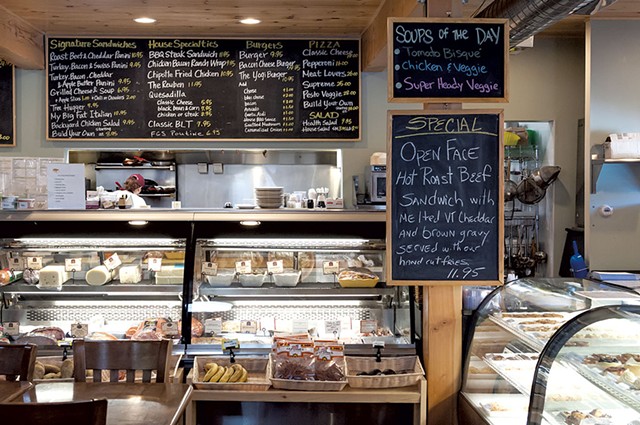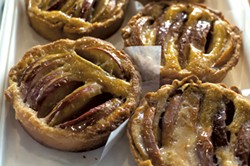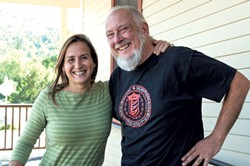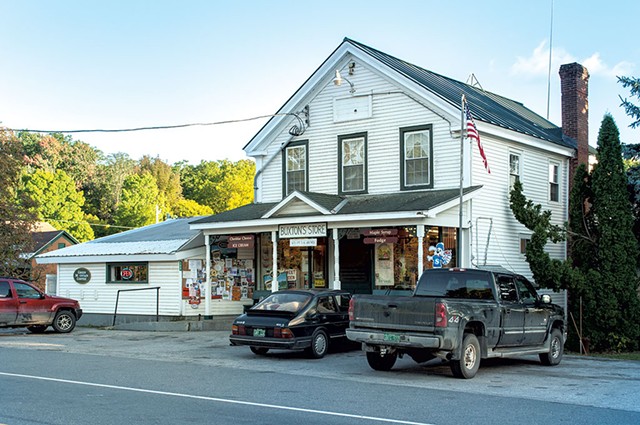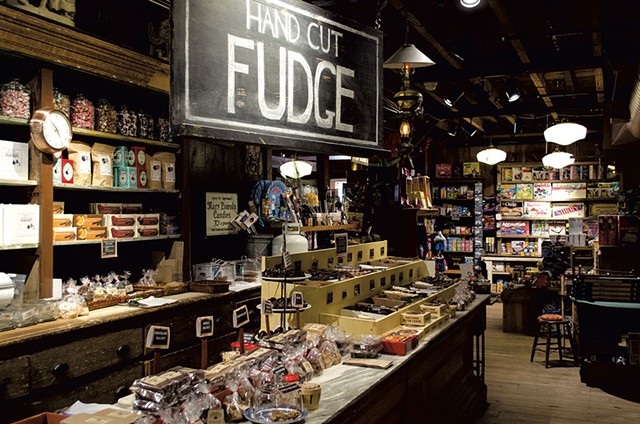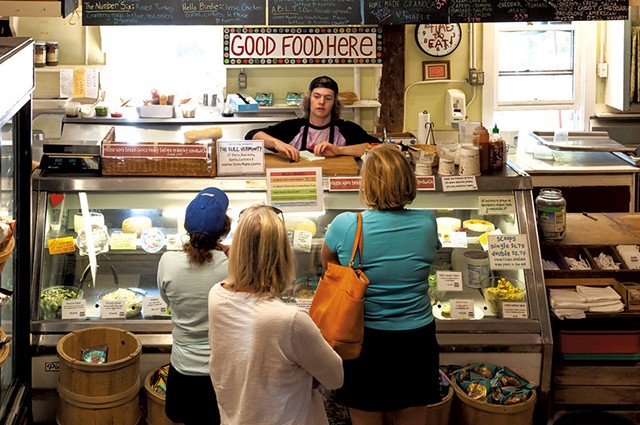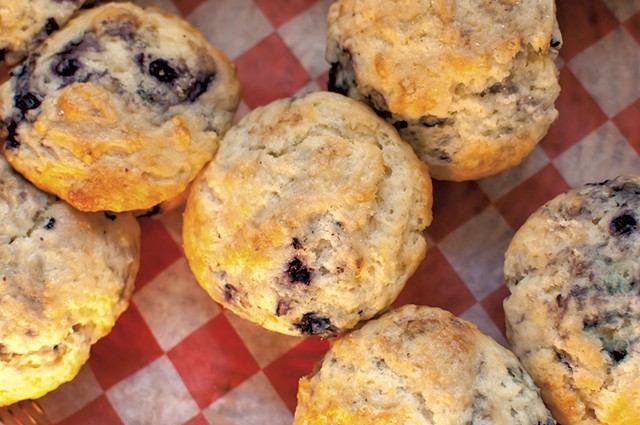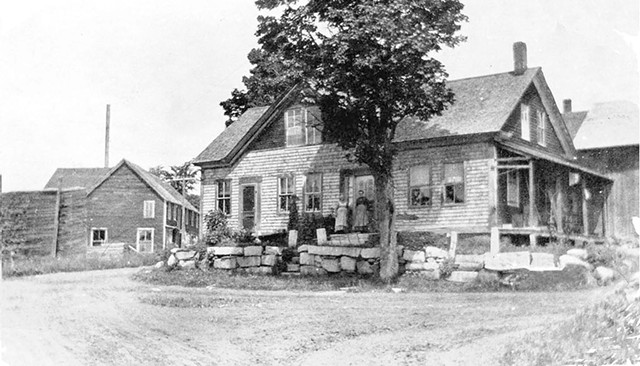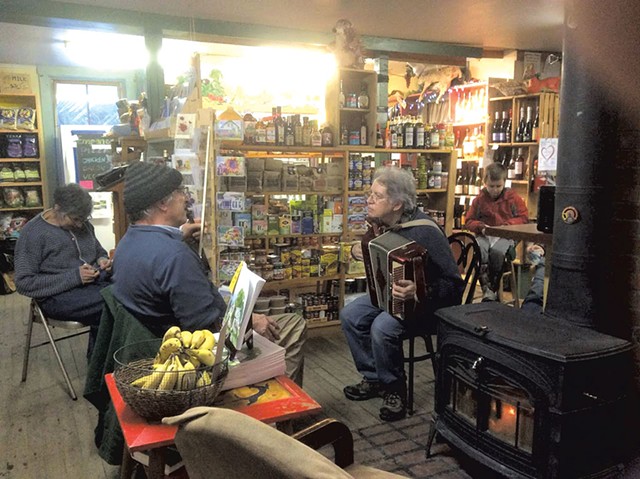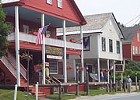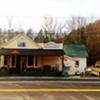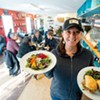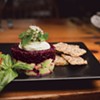Published October 4, 2016 at 2:09 p.m. | Updated October 22, 2020 at 6:33 p.m.
Falls General Store sits at the easterly end of Moretown Gap, a mountain pass veiled in early-fall foliage turning burnt yellow and burgundy. From the front porch, visitors can smell coffee grounds and butter. The building looks pretty fresh for one nearing its 130th birthday; it was closed, gutted and restored to its original façade two years ago, when ownership passed to husband-and-wife team Vince and Norma Rooney.
Inside the store, bulk bins of rice, almonds and dried beans share the aisles with pantry staples and wine racks. Tables and chairs sit beside burbling coffee pots, coolers of local cheese, and a grab-and-go hot bar with one remaining foil-wrapped sandwich.
The back of Falls General holds an open kitchen and bakery. Three glass cases in front display everything from deli meats, chicken thighs and five-pound wedges of Cobb Hill Cheese to peach-brown butter tarts, pecan shortbreads and rounds of cheesecake dribbled with blueberry jam. A customer lines up for his usual — a maple latte and a newspaper — while an employee rushes in from the kitchen to place two steaming pizza pies on the countertop.
"We make everything here, from mayonnaise to cookies," says Norma Rooney, who's reviewing order lists at a table near the milk cooler. "We scratch-make pizza dough and bread for our sandwiches, too."
The Rooneys owned a house in Northfield Falls for 19 years before purchasing the store in 2010. Heavy-duty renovations kept them from opening its doors until 2014. "We wanted to bring the community back together again by feeding their bodies and nurturing their souls," Norma says. She's alluding to a menu rooted in local and natural foods and to a yoga studio that shares the upstairs living quarters. "And guess what? We stayed open."
"You'd have even more business if you opened at six a.m. instead of seven," a man with a long white ponytail interjects amiably. He lives less than a minute's walk from the general store and stops by often, he says. While he may quibble with the opening hours, this regular, writer and composer Dennis Báthory-Kitsz, attests the wait is worth it: "Vince Rooney is a fantastic baker."
Báthory-Kitsz is well informed on the topic of Vermont general stores; he literally wrote the book on it. The first edition of his Country Stores of Vermont: A History and Guide was released in 2008; the third edition will hit shelves in 2018. Báthory-Kitsz spent nine years as executive director of the Vermont Alliance of Independent Country Stores, a nonprofit that aims to promote the state's general stores while preserving their history and distinct contributions.
In Country Stores of Vermont, Báthory-Kitsz writes that about 300 general stores lie within the 261 miles stretching from the Canadian border to Massachusetts. (That's more than the number of named towns in Vermont, 251.) These institutions have survived two world wars, the Great Depression, hurricanes, electrical fires, supermarkets, convenience stores, Vermont winters and the internet. The question is: how?
A general store carries "general" convenience items such as beer, diapers, dental floss and lottery tickets, but, unlike a convenience store, it must also carry a sense of social purpose. Each store is unique to its community and can only endure by changing along with it. Hence, while Walmarts and Costcos are uniform across America, the general store in East Corinth differs from the one in Charlotte. Such stores are the best place to get a read on a town's "general" needs, which might include a chunk of lard or bullets for a rifle or a bottle of pinot or driving directions or Fluffernutter or a post office. Country stores are as diverse as the populations they serve.
Over coffee at the Falls General Store, Báthory-Kitsz describes country stores as small-community inventions fostered by the particular geography of a state sliced in two by the Green Mountains. Back in the day, he notes, each Vermont town had a mayor's office, a school, a church and a general store, perhaps with a post office attached. The country store was the town's focal point, providing everything a tiny community needed.
"The frequency from one store to another," adds Báthory-Kitsz, "was determined by the distance that horses could go without watering — about seven miles on average." Stores had to be densely concentrated; before the Industrial Revolution brought roads and railways to connect isolated communities, the route from Waterbury to Stowe, for instance, was a cow path.
Since then, Vermont's country stores have had to adapt — whether easily or resentfully — as their communities evolved. Take the Castleton Village Store. The weather-weary sign that hung above the door a century ago is still mounted near the register, above a shelf of baseball hats. The stocked shelves cover all economic price points: Customers can choose between packets of Swiss Miss and Vermont Farmgirl cocoa; between meatball Hot Pockets and ground beef from Anderson Hill Farm.
And, though the store sells "beer and cigarettes for the kids at Castleton University up the road," says general manager Robert Staudter, the heart of the place is its wine section. Staudter, known locally as "the wine guy," manages one of the most extensive wine selections in Rutland County. "We have a vast range," he says. "Boxes of Franzia, Dom Pérignon, local blends, organic bottles, a nice Italian Ruffino..."
A century ago, there probably wasn't a high demand for wine in Castleton. But shifting demographics and an influx of tourism — Lake Bomoseen is just down the road — called for updates that continue to draw a loyal crowd.
Meanwhile, in Orwell a white wooden house marked "Buxton's Store" sits midway down Main Street. Its façade is more than 100 years old, and its insides are stocked with Vermont-made goods, commercial staples, ice cream, fishing gear, hunting licenses and an enormous wheel of Cabot cheese under a plastic hood. Buxton's is also the area's go-to spot for game reporting, a busy place when changing leaves mark the start of deer season. On a chilly fall afternoon, a couple of regulars hang out over coffee on the benches out front, chatting about archery hunting and the best knives for dressing a deer.
"General stores are the place for folks to connect with each other," says Paul Bruhn, who has been executive director of Preservation Trust of Vermont for the past 36 years. "This goes for all sectors of the population. People with resources and people without them. Newcomers and fourth-generationers.
"When a store is lost," he continues, "you lose that sense of communal identity. Your town just becomes a rural subdivision."
Why, then, do country stores close? Plenty of reasons: if the area can't sustain it economically; if management can't handle it financially; if it refuses to keep up with the changing needs of a community; if too many big-business competitors overtake its role as a supplier of everyday needs. Ownership transitions are especially tricky, Bruhn notes. Maybe the third generation to inherit a family-legacy store refuses to take ownership. Maybe extensive renovations drive up prices, or a store sold for more than it's worth leaves the new owners in a pile of debt. Another factor to reckon with is owner exhaustion: Satisfying the community's "general" social and economic needs is a job that most general stores must perform 12-plus hours a day.
"It's your whole life," says one general store owner, who wishes to remain anonymous. "When I think about closing, it's a lot of mixed feelings. You stay because you're a part of the community, but it's a 24-7 job that I've been doing for 30 years. I don't know what I'll decide. Call me back in six months."
Nancy Tschorn, co-owner of the Wayside Country Store in Arlington, perhaps says it best: "A job is what you do, not who you are — unless you own and operate a country store."
Báthory-Kitsz mentions another reason for store closure: Some stores watch their communities vanish. Without the locals, the pillar of their purpose, general stores must turn to serving a transient population. Peru's J.J. Hapgood General Store and Eatery is a prime example.
"About a decade ago, the store was in decline," says Báthory-Kitsz. "The road that used to go through that main portion of Peru was diverted." Peru was already a tiny community, and "Without a thriving route past the general store, [the store] shriveled."
The general store closed for four years before being purchased in 2013 by Peru local Juliette Britton and her husband, Tim. Determined to save the centuries-old establishment, the couple launched extensive renovations, including building a spanking-new kitchen to emphasize the "eatery" portion of the spot's name.
For breakfast, J.J. Hapgood has organic and fair-trade coffee, housemade pastries and avocado toast with poached eggs from Someday Farm. Lunch might include flame-licked pizzas from the wood-fired oven, pork belly banh mi or a local beef burger on brioche. On a sunny fall afternoon, customers can take mason jars of beer out to a back patio complete with picnic tables and cornhole. Last year, Sir Paul McCartney stopped in at J.J. Hapgood and ordered a Margherita pizza and an organic kale salad, according to the store's website.
A hundred years ago, the citizens of Peru were probably not stirred by the prospect of avocado toast. But when the country store lost its place as the town's center, it needed a new clientele. Now it serves both locals and vacationers hitting up Bromley Mountain, Stratton Mountain or Killington Ski Resort, who want a nice place to dine and a one-stop shop for Vermont specialty items.
"Growing up here has helped [in] the process of knowing what the community needs and what changes we can make," says Juliette Britton. "[The store has] been well received. We get lots of people coming in from [nearby tourist outlets], but we have regulars, too. We have a list of local emails that get a discount code for the store, like a local club card for coffee or Pizza Club on Wednesdays, when you get $5 off your order."
While tourists may see general stores as quaint, their endurance doesn't depend on maintaining an impervious sense of the past, in Báthory-Kitsz's view. As the social heart of a community, a general store is as indicative of present and future populations as it is of those preceding.
"Even if it's tourism that makes [a store] survive," Báthory-Kitsz says, "the crucial part is that the store's not lost. Its presence alone is enough to start being there for its community."
What about the bigwig of general-store tourism, the Vermont Country Store? Founded by the Orton family in 1946, the store is now a corporate behemoth with a trademarked name and a national catalog. That trademark is why Pittsfield's general store, initially christened a Vermont Country Store, is now the Original General Store, according to current store owner Kevin Lasko.
The Weston home base of the Vermont Country Store is the ultimate embodiment of country-store nostalgia. Old-timey music tinkles through the parking lot; inside, there are rows of chocolate and colored candies, an apothecary selling soaps and hand cream, floor-length flannels, chintz, cheese samples, and a wooden sign that reads "Hand-Cut Fudge." Customers can pick up a 16-ounce can of B&M brown bread with raisins, or jars of chowder and salsa embossed with the company's branding.
Báthory-Kitsz calls the place a deliberate showpiece. "But people still go there," he says. "And it's still owned by the Orton family. It looks like a country store and sells like a country store, but it doesn't have the economic risk of a country store. In that sense, it doesn't have to adapt like a country store; it's a corporatized version."
Some commentators have made similar arguments about the Warren Store, which is located between two top tourist destinations, Sugarbush Resort and the Mad River Valley. The store originated as a stagecoach shop and boarding house in 1839. Nowadays it thrives, aided by a wealthy tourist trade and coverage in publications like Yankee Magazine and the New York Times, posing the question of whether it really still caters to a local population. As if in a joking nod to its in-between status, the store sells T-shirts with the slogan "Almost World Famous."
But the Warren Store tempers its relative renown by supplying what the town of Warren seeks, be it an afternoon sandwich or a sense of humor. (A skewered marshmallow in a glass case is marked "In Case of Fire.") During a busy lunch hour, the store is full of locals and out-of-towners picking up subs and selecting sodas from a decades-old cooler lined with wood. Upstairs, there are woolen slippers and winter jackets; below, shelves of candy and toilet paper and a basket of local Paula Red apples. A deliveryman wheels in a few cases of the Alchemist's Heady Topper.
In the kitchen behind the store, baker Crystal Wortman and her husband, Jerome, wrap golden ginger biscotti and molasses cookies the size of dinner plates. A tray of tender pumpkin whoopie pies emerges from the fridge, ready for the lunch crowd.
On a side patio over a rambling creek, folks tuck into thick turkey sandwiches and apple cider floats topped with pumpkin ice cream from Kingdom Creamery of Vermont. Hops snake up a nearby wall, a gift from Bent Hill Brewery in Braintree — and a tribute to the store's reputation as a beer destination, especially for lovers of Lawson's Finest Liquids (brewer Sean Lawson is a Warren local). Manager Jack Garvin, who has worked at the Warren Store since the 1980s, points to a small shrine of rocks and flowers beside the hops; it's an homage to Noella Couture, who worked at the register for two decades before passing away a couple years ago.
In the words of Báthory-Kitsz, "Stores survive because they have a purpose beyond mere commerce." When Tropical Storm Irene hit Vermont in August 2011, many towns along Route 100 were cut off entirely. General stores once again became the focal points of these communities, the sole purveyors of supplies, help and communication.
Or consider the Adamant Co-op, which turned a late-night store robbery into a prompt for daily jam sessions and board-game tournaments. The member-owned general store, which celebrated its 80th birthday in 2015 with a cookbook, was held up one winter evening in late December 2015.
"It was very traumatic for our clerk," says manager Regina Thompson. "We're in a very rural area that's dark and isolated at night, especially in the winter.
"We can only afford one clerk at a time, but somebody had the idea to bring in a couple of instruments to keep them company." The solo vigils became nightly gatherings at the co-op for music, poetry discussions, book clubs and Scrabble tournaments. Before nightfall, groups of locals arrived in the driveway, each toting supplies for the evening's designated activity.
Every night for the next two months, the Adamant Co-op was full.
More By This Author
Speaking of...
-

Waterbury: What to See, Do and Eat During the Eclipse
Mar 6, 2024 -

Vermonting: Close-to-Home Travel Itineraries for the Mad River Valley, Glover and Upper Valley
Aug 25, 2020 -

Vermonting: Slippers, Tubing and Beer in the Mad River Valley
Jul 22, 2020 -

Vermonting: A Day Trip to Arlington and Manchester
Jul 15, 2020 -

Adamant Co-op Adapts to the Coronavirus Era
Jun 9, 2020 - More »
Comments
Comments are closed.
From 2014-2020, Seven Days allowed readers to comment on all stories posted on our website. While we've appreciated the suggestions and insights, right now Seven Days is prioritizing our core mission — producing high-quality, responsible local journalism — over moderating online debates between readers.
To criticize, correct or praise our reporting, please send us a letter to the editor or send us a tip. We’ll check it out and report the results.
Online comments may return when we have better tech tools for managing them. Thanks for reading.



































